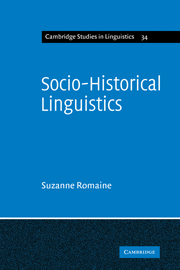Book contents
- Frontmatter
- Contents
- Dedication
- Preface
- Dedication
- 1 Methodology and aims
- 2 Methods for a sociolinguistic study of historical syntax
- 3 The history of the relative clause/markers in English with special reference to Middle Scots
- 4 The linguistic variables
- 5 The extralinguistic variables: methods for the reconstruction of language in its social context
- 6 Analysis of the data by two sociolinguistic techniques: cross-product analysis and implicational scaling
- 7 Variable rule analysis of the data
- 8 The bearing of sociolinguistic data on linguistic hypotheses
- 9 On the epistemological status of sociolinguistic theory
- Bibliography
- Index
7 - Variable rule analysis of the data
Published online by Cambridge University Press: 05 May 2010
- Frontmatter
- Contents
- Dedication
- Preface
- Dedication
- 1 Methodology and aims
- 2 Methods for a sociolinguistic study of historical syntax
- 3 The history of the relative clause/markers in English with special reference to Middle Scots
- 4 The linguistic variables
- 5 The extralinguistic variables: methods for the reconstruction of language in its social context
- 6 Analysis of the data by two sociolinguistic techniques: cross-product analysis and implicational scaling
- 7 Variable rule analysis of the data
- 8 The bearing of sociolinguistic data on linguistic hypotheses
- 9 On the epistemological status of sociolinguistic theory
- Bibliography
- Index
Summary
Metaphysics and methodology are intertwined in curious ways. Although there may be difficulty converting a metaphysics into a method of research, there seems to be little difficulty involved in converting a methodology into a metaphysics – one can arrive at remarkable discoveries by mistaking a property of the analysis (working assumptions, methods, etc.) for a property of the data.
E.A. Burtt (1924)In this chapter I discuss the contribution which variable rule analysis makes to my study of the relative system, and show how some hypotheses about the types of rules needed to describe the variation can be tested using the Cedergren–Sankoff variable rule program. I will be particularly concerned with examining the kinds of arguments which have been advanced in favor of the claim that the program (and variable rule analysis) gives new and reliable evidence for judging certain linguistic issues.
Cedergren and Sankoff's (1974) work on the probabilistic component of variable rules has had a major impact on quantitative analysis in sociolinguistics. The ramifications of this shift in emphasis from frequencies to probabilities are enormous; yet, they have scarcely been treated cogently in their relation to the construction of a sociolinguistic theory which claims to have an empirical base. Labov (1975a: 228), for example, has maintained that the ‘new tools of probability theory’ give us a ‘dramatic increase in power and perception’. The claim about increased power is true, though, ironically perhaps, not in the way Labov seems to think (cf. Romaine 1981a).
Probability theories might be considered more powerful with respect to their domain of application because, strictly speaking, they cannot be confirmed or disconfirmed by empirical findings.
- Type
- Chapter
- Information
- Socio-Historical LinguisticsIts Status and Methodology, pp. 183 - 217Publisher: Cambridge University PressPrint publication year: 1982



